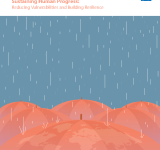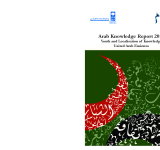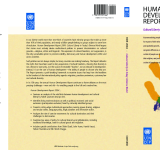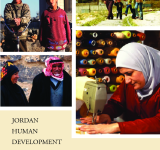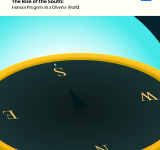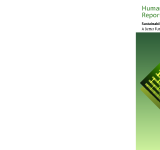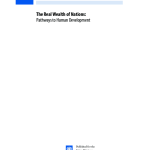human development index
يلقي تقرير التنمية البشرية لعام 214 الذي جاء بعنوان "المضي في التقدم: بناء المنعة لدرء المخاطر" الضوء على الحاجة لترويج خيارات الناس وحماية إنجازات التنمية البشرية. ويعتبر التقرير أن الاستضعاف والتعرض
يسلط التقرير الضوء على واحدة من أهم القضايا أمام المجتمع الإماراتي، وهي مسألة إدماج الشباب وتمكينهم من المساهمة الفاعلة في نقل وتوطين المعرفة باعتبارها نقطة انطلاق لإقامة مجتمع المعرفة في الدولة،
Accommodating people's growing demands for their inclusion in society;; for respect of their ethnicity;; religion;; and language;; takes more than democracy and equitable growth. Also needed are multicultural policies that recognize differences;; champion diversity and promote cultural freedoms;; so that all people can choose to speak their language;; practice their religion;; and participate in shaping their culture—so that all people can choose to be who they are. In recent years the Human Development Report has argued strongly that this is as much a question of politics as economics—from protecting human rights to deepening democracy. Human development is first and foremost about allowing people to lead the kind of life they choose—and providing them with the tools and opportunities to make those choices. The 2004 Report builds on that analysis;; by carefully examining—and rejecting—claims that cultural differences necessarily lead to social;; economic and political conflict or that inherent cultural rights should supersede political and economic ones. Instead;; it provides a powerful argument for finding ways to “delight in our differences”;; as Archbishop Desmond Tutu has put it. It also offers some concrete ideas on what it means in practice to build and manage the politics of identity and culture in a manner consistent with the bedrock principles of human development.
This report consists of eight chapters and aims to summarise the key concepts of human development. It introduces the Human Development Index;; provides an overview of Jordan's human development achievements;; examines the regional vulnerability context that has constrained Jordan's options in its pursuit of social and economic development;; provides a platform for the poor to express their views and perceptions in relation to their poverty status;; reviews the policies;; institutions and processes that affect the poor;; examines the government's attempts to stimulate entrepreneurialism;; promotes the application of a rights-based approach;; in which all citizen are equally empowered and have the capacity and the appropriate enabling environment that allows them to claim their entitlements according to law. Finally;; the study examines the various reform initiatives in progress and assesses the extent to which Jordan is committed to the process.
The 21st century is witnessing a profound shift in global dynamics;; driven by the fast-rising new powers of the developing world. China has overtaken Japan as the world's second biggest economy;; lifting hundreds of millions of people out of poverty in the process. India is reshaping its future with new entrepreneurial creativity and social policy innovation. Brazil is raising its living standards by expanding international relationships and antipoverty programmes that are emulated worldwide. But the “Rise of the South” is a much larger phenomenon. Indonesia;; Mexico;; South Africa;; Thailand;; Turkey and other developing countries are becoming leading actors on the world stage. The 2013 Human Development Report identifies more than 40 developing countries that have done better than expected in human development in recent decades;; with their progress accelerating markedly over the past 10 years.
The 2011 Human Development Report argues that the urgent global challenges of sustainability and equity must be addressed together – and identifies policies on the national and global level that could spur mutually reinforcing progress towards these interlinked goals. Past Reports have shown that living standards in most countries have been rising - and converging - for several decades now. Yet the 2011 Report projects a disturbing reversal of those trends if environmental deterioration and social inequalities continue to intensify;; with the least developed countries diverging downwards from global patterns of progress by 2050. The Report shows further how the world's most disadvantaged people suffer the most from environmental degradation;; including in their immediate personal environment;; and disproportionately lack political power;; making it all the harder for the world community to reach agreement on needed global policy changes. The Report also outlines great potential for positive synergies in the quest for greater equality and sustainability;; especially at the national level. The Report further emphasizes the human right to a healthy environment;; the importance of integrating social equity into environmental policies;; and the critical importance of public participation and official accountability. The 2011 Report concludes with a call for bold new approaches to global development financing and environmental controls;; arguing that these measures are both essential and feasible.
The 2010 Report continues the tradition of pushing the frontiers of development thinking. For the first time since 1990;; the Report looks back rigorously at the past several decades and identifies often surprising trends and patterns with important lessons for the future. These varied pathways to human development show that there is no single formula for sustainable progress—and that impressive long-term gains can and have been achieved even without consistent economic growth. Looking beyond 2010;; this Report surveys critical aspects of human development;; from political freedoms and empowerment to sustainability and human security;; and outlines a broader agenda for research and policies to respond to these challenges.

